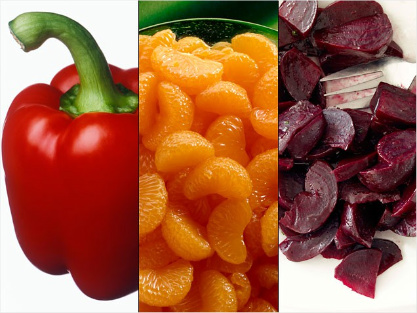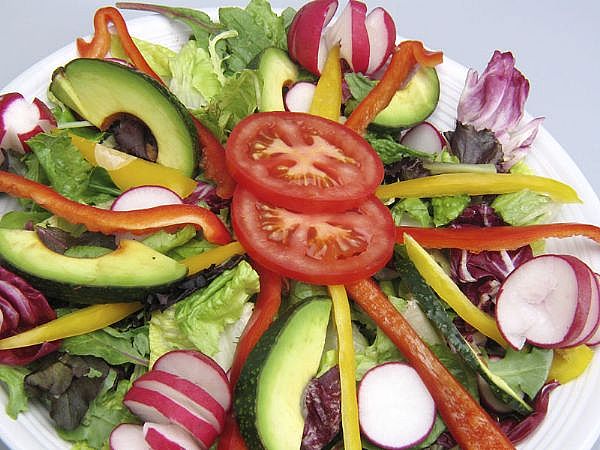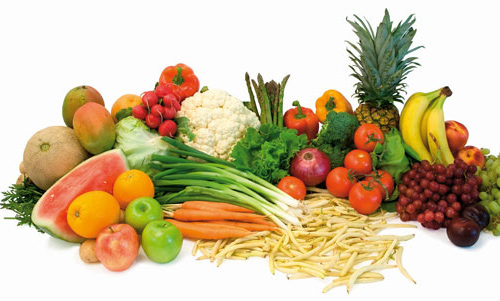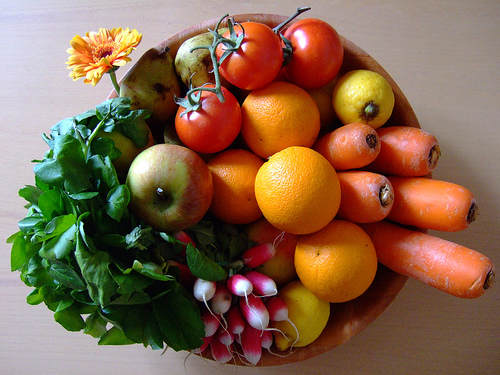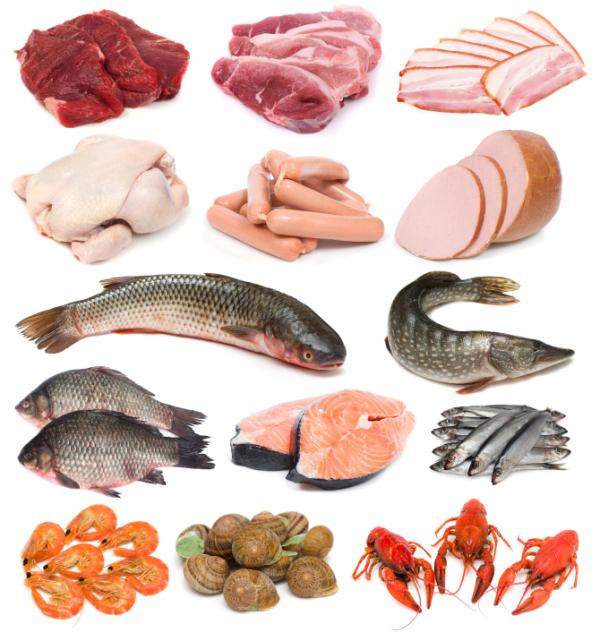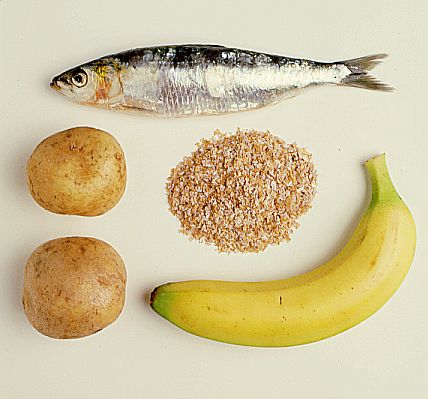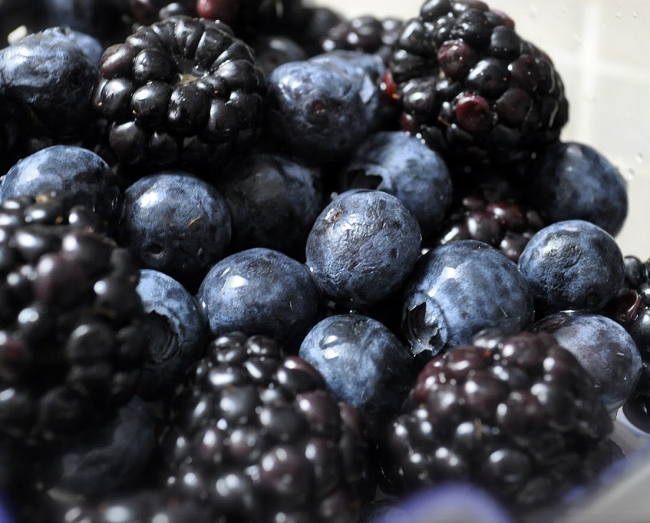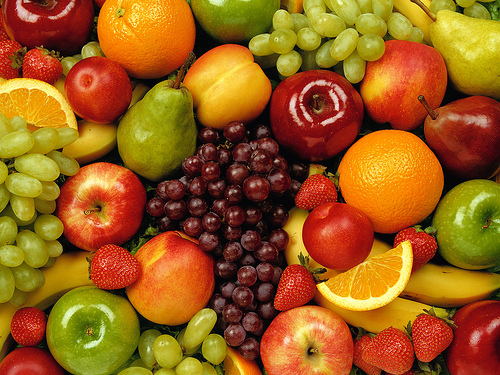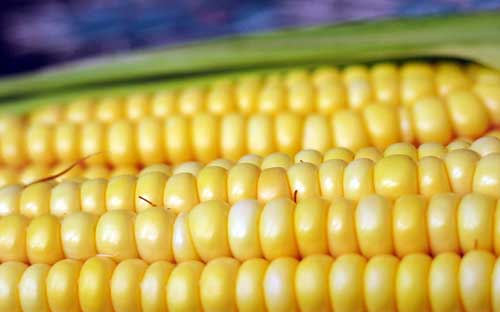Intake of vitamins is essential to the health of skin. A proper dietary intake of all vitamins is imperative to keep skin resilient and young. The deficiency of vitamins makes the skin lifeless, blotchy, dry or oily. Most of the vitamins are simplest form of antioxidants and help prevent the skin from free radicals, wrinkles and premature aging. Vitamins also constitute the building blocks of several cells, including skin tissues. They also help the skin fight damage due to sun exposure and pollution by activating the oxidizing influences to which the skin is subjected. The skin needs to be fed both inside and out for more radiant, healthy and youthful glow. Here are 11 amazing skin healing vitamins, which when combined with a good diet can help keep your skin looking not only healthy, but also years younger.
Vitamin C
Vitamin C is also known as the doctor of skin. It has antiseptic and healing properties that help fight against effects of sunlight. This vitamin reduces free radicals and lessens the damage of the same. It also helps to fight the harmful effects of sunlight, smoke and pollution on the skin. Vitamin C is readily available especially in citrus fruits and vegetables. Doctors recommend a daily dosage up to 500 to 1,000 milligrams. The combo of vitamin C and vitamin E can do wonders when it comes to protection of skin from sun exposure. Several creams are also available in the market that contains L-ascorbic acid form of vitamin C. This acid can easily penetrate through skin layers and provide nourishment.
Vitamin E
Vitamin E is an effective antioxidant and helps in fighting sun damage to the skin cells as well as cancer causing cells. Studies have established that if vitamin A and Vitamin E are taken together, they reduce the basal cell carcinoma by 70 percent. In addition, it is a very good moisturizer which makes the skin smoother and soft. This vitamin helps in keeping wrinkles at bay. However, you need to be cautious about the intake of Vitamin E in your daily diet. Large doses of this vitamin can lead to serious repercussions. Doctors advise to keep the dosage of vitamin A within 400 international units per day. Vitamin E is used to make moisturizers, creams, lotions, sun screen lotions and serums to soothe dry, rough skin. Milk and diary products are good source of vitamin E. Recommended dietary intake is 15mg.
Vitamin A
Vitamin A is one of the most essential vitamins that repair and maintain the health of the skin. Researches have shown that this vitamin has multifarious benefits including reduction in lines and wrinkles, good acne control and some psoriasis relief. This vitamin is found in abundance in green vegetables and fruits. The synthetic vitamin-A compound is used to make different acne treatment and anti-aging creams. Vitamin A is also used to cure skin wrinkling and mottled pigmentation caused by chronic sun exposure. Eat lots of vegetables, especially green vegetables. In case you have enough vitamin A present in your body, then stuffing all vitamin A rich food won’t help. However, in case of deficiency, you will soon develop skin related symptoms. In the initial stages you will find your skin is dry and flaky in complexion. Recommended daily intake is 900 µg.
Vitamin K
Vitamin K not only helps in clotting the blood but also in reducing under eye circles. This vitamin is also very effective at reducing scar and bruise marks. This vitamin is widely used in creams and serums to treat dark circles. Spring and natural river water often contains natural supplies of important minerals. If you regularly wash your face with mineral water, it will significantly reduce several skin irritations. Vitamin K also plays a key role in preventing skin cancer. This vitamin protects the skin from sun damage and lowers the chances of skin cancer. You can include Vitamin K in your regular diet in the form of whole-grain cereals, kale, seafood, garlic and eggs. The recommended dietary intake stands at 120 µg.
Vitamin B Complex
Vitamin B Complex plays a pivotal role whenever it comes to skin. Known as biotin in cynical terms, this nutrient forms the foundation of all skin, nail and hair cells. Being the basic constituent, the deficiency of this vitamin causes dermatitis, hair loss, chipped and discolored nails and unhealthy skin. Mild deficiency can trigger symptoms. This vitamin is produced by our body itself; however, bananas, eggs, rice and oatmeal are rich source of this vitamin. A balanced diet with vitamin B complex can help you fight different skin related problems. Several creams are made using this vitamin. These creams are widely used to give instant healthy glow to the skin. It hydrates the cells and increases the overall tone at the same time. The anti-inflammatory nature of this vitamin helps to soothe dry, irritated skin.
Vitamin B9
Vitamin B9 is responsible for rapid cell division and growth of cells, including the skin cells. It also keeps the intestinal tract healthy, thereby preventing any skin disease due to stomach problems. This vitamin also plays a pivotal role in synthesis and repair of DNA as well as protein metabolism, which again forms the building blocks of the skin. Deficiency of vitamin B9 or folic acid can cause anaemia, serious skin disorders, loss of hair, impaired circulation, a greyish-brown skin pigmentation, fatigue and mental depression. This vitamin is needed for healthy skin, hair, eyes and liver. Folic acid is water soluble, thus the excessive amount of it gets drained with urine. This vitamin is found in supplements and fortified foods including dark leafy as well as root vegetables, beets, whole grains, wheat germ, salmon, orange juice, avocado and milk. A daily intake of 400 µg is recommended by doctors.
Vitamin B12
Cobalamin or popularly known as Vitamin B12 is required by the body to carry out a plethora of biological processes. Right from metabolism of cells to smooth function of nervous system, this vitamin takes care of overall healthy physical state. Our hair, skin and nails need Vitamin B12 to regenerate and growth. It also promotes flawless skin and helps fight free radicals. Dry skin, wrinkles, acne, brittle hair and nails are a result of Vitamin B12 deficiency. It also causes skin problems such as dermatitis. It also helps in absorption of folic acid. Researches state that Vitamin B12 boosts the production of Melatonin, a hormone that supports healthy sleep patterns, which again is essential for healthy skin. Vitamin B12 is found in meat and other related food items. The right dietary supplement of this vitamin up to 2.4 µg can help you keep your skin look healthy and younger.
Vitamin B6
Vitamin B6 plays different role in several enzymatic reactions in our body. Studies have found that this vitamin is responsible for synthesis of nucleic acids, amino acids, phospholipids, histamine and other essential carbohydrates. Slightest deficiency of this vitamin causes several skin related problems especially seborrheic d
ermatitis and eczema. Vitamin B6 is actively involved in production of the “building blocks” for every tissue in the body. This vitamin is directly absorbed from the food in intestines and deficiency is rarely recorded. However, people suffering inflammatory bowel conditions or who drink large quantities of alcohol or take drugs are at a high risk for developing a vitamin B6 deficiency. Foods like meats, fish (tuna) and vegetables such as spinach, broccolli, Brussels sprouts and cauliflower are rich in vitamin B6. Doctors recommend 1.7mg of daily dietary intake.
Provitamin B5
Provitamin B5 is alcohol form of vitamin B5 which has the properties to heal and regenerate the skin. It is used in several lotion, creams and ointments for skin. It easily penetrated through the skin and is transformed back into vitamin B5 by the skin. Studies have shown that Provitamin B5 has natural broad abilities to moisturize, soothe and heal skin. It also helps the skin retain water, thus, is an effective hydrant for skin. Applying Provitamin B5 on the skin increases hydration improves skin softness, elasticity and soothes dry, scaly skin. In addition, Provitamin B5 acts as a natural skin healer and protectant and offers relief from itchiness and pain and reduces redness. Meat, broccoli, grapes and avocados are some vitamin B5 rich food. A daily intake of 5mg is recommended for healthy skin, growth of new cells and fighting infection.
Vitamin B2
Vitamin B2 also known as Riboflavin plays a crucial role in maintenance and production of cells, including skin cells. It enhances immunity and is responsible for overall maintenance of health. Being an effective antioxidant it helps fight different skin related aliments. Deficiency of vitamin B2 causes mouth sores, tongue pain, itching or burning eyes and light sensitivity. In addition, poor digestion, retarded growth and slow mental responses have been reported in some cases. One can include organ meats, nuts, cheese, green leafy vegetables, fish, legumes, whole grains, yogurt, eggs, milk and lean meat in his diet to meet the daily requirement of this vitamin. This vitamin is water soluble and in case of excessive intake is drained out of the body with urine. The recommended dietary intake of this vitamin is 1.3mg.
Vitamin B3
Vitamin B3 offers multifarious benefits to the skin. It is very effective against acne and is widely used in processing several anti-aging creams. The anti-inflammatory and skin brightening properties of vitamin B3 help fight pigmentation of skin and wrinkles. Even a slight deficiency of this vitamin can trigger several diseases including pellagra, delirium, amnesia and dermatitis. The other symptoms like irritability, poor concentration, anxiety, fatigue, restlessness, apathy and depression also ensue due to the lack of vitamin B3. Yeast, corn, rice, wheat, fish, peanuts and tomatoes are vitamin B3 rich foods which can be included in your daily diet. Recommended dietary as recommended by doctors of this vitamin is 16mg.




